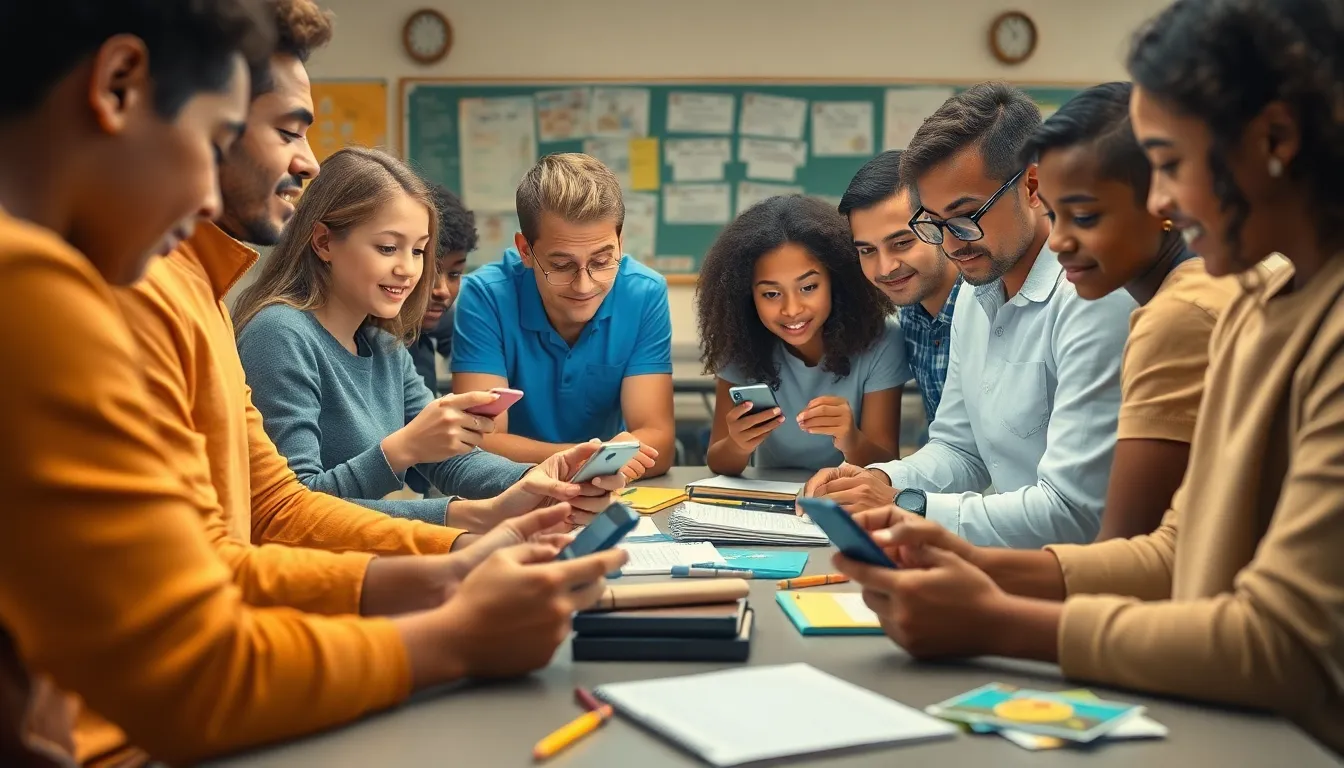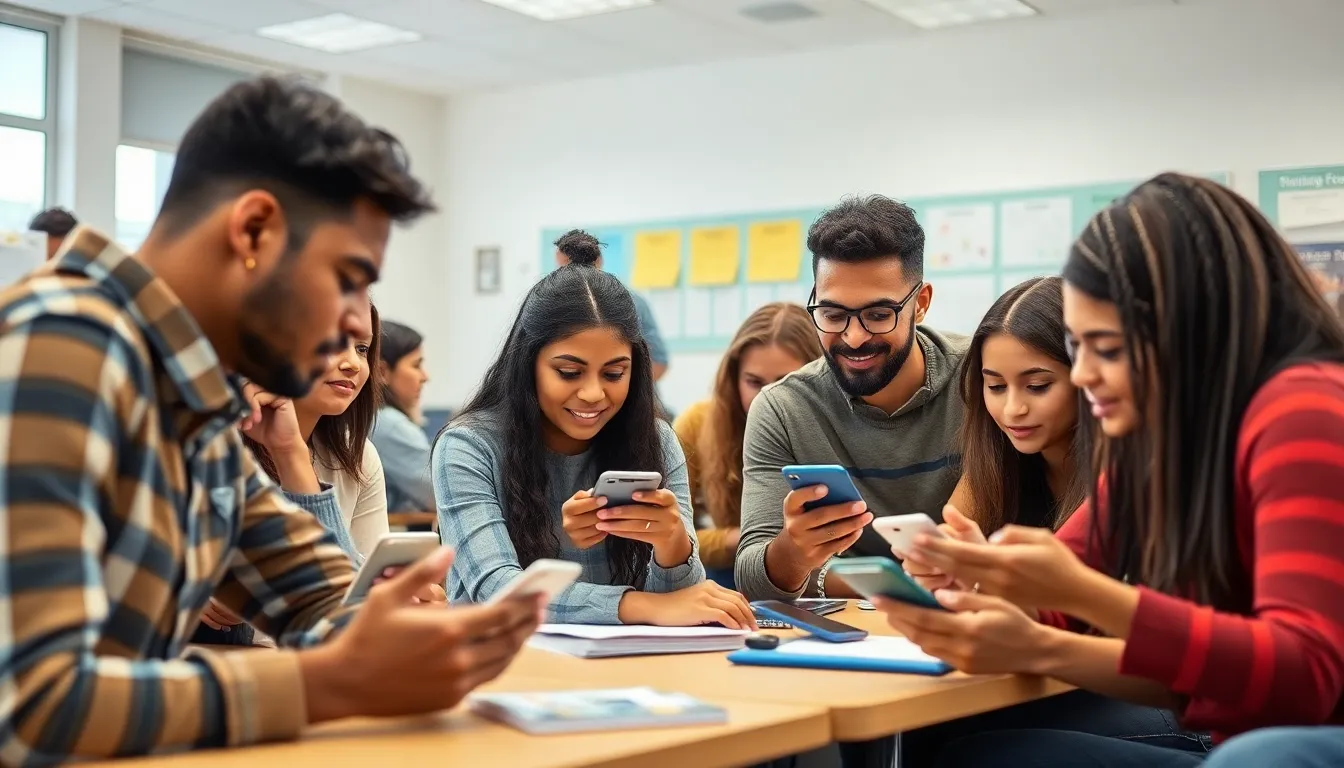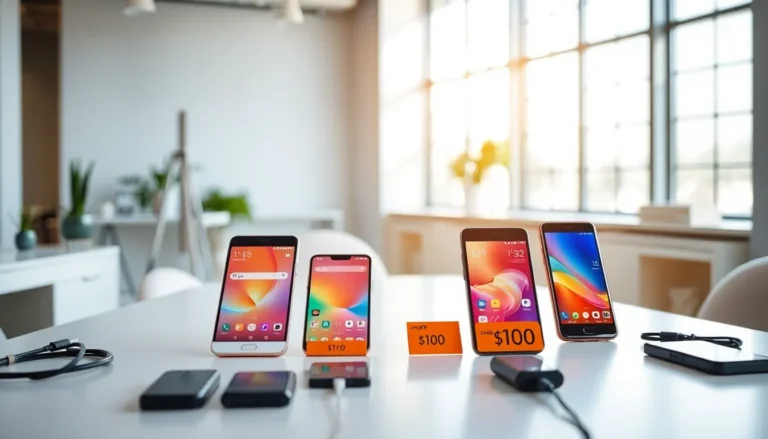In today’s tech-savvy world, banning phones in schools feels a bit like trying to put toothpaste back in the tube. Students rely on their devices for more than just TikTok dances and memes; they’re essential tools for learning and communication. Imagine a classroom where students can access information in real-time, collaborate on projects, and even participate in interactive lessons—all thanks to their trusty smartphones.
Table of Contents
ToggleThe Role of Technology in Education
Technology, particularly smartphones, plays a crucial role in educational settings. Devices facilitate innovative learning methods and improve student engagement.
Enhancing Learning Opportunities
Smartphones allow access to a wide range of educational apps. Apps like Quizlet enhance memorization through flashcards and quizzes. Interactive learning platforms also promote collaboration among students on projects. Many students utilize features like video conferencing for group discussions. These tools help develop vital skills such as teamwork and communication. Integration of technology in classrooms supports personalized learning experiences tailored to individual needs.
Access to Information
Instant access to information is one of the greatest advantages of smartphones. Students can quickly search for relevant resources during lessons. They find answers to questions in real-time, reinforcing their understanding of topics. Access to educational websites and online libraries broadens the scope for research. Many students use digital dictionaries and translation apps for language studies. Quick access to information improves critical thinking and analytical skills by encouraging curiosity and exploration.
Promoting Communication

Smartphones serve as an essential communication tool for students, connecting them with their environment and supporting their educational journey.
Staying Connected with Parents
Devices enable students to maintain direct contact with parents throughout the school day. Parents can quickly reach their children in case of emergencies, ensuring peace of mind for families. Furthermore, easy communication fosters stronger relationships, allowing parents to stay informed about school events and academic progress. Quick messaging apps facilitate group chats where parents can collaborate on school-related activities. Inclusion of this technology strengthens the home-school connection, enhancing student support systems.
Peer Collaboration
Mobile phones contribute significantly to peer collaboration among students. Group projects benefit from immediate access to sharing documents and ideas for brainstorming sessions. Social learning flourishes through various educational apps that encourage teamwork and creativity. Interactive tools allow classmates to communicate and coordinate on assignments seamlessly, whether they are at school or at home. Smartphones’ collaborative features promote a sense of community while enhancing problem-solving skills and critical thinking abilities.
Developing Responsibility
Developing responsibility is crucial for students in today’s digital age. Smartphones play a key role in helping students cultivate essential life skills.
Time Management Skills
Time management skills improve as students use smartphones for organization. Many educational apps, like calendars and task managers, assist with planning assignments and deadlines. Creating reminders helps prioritize schoolwork, ensuring students stay on track. By managing their time effectively, students enhance their productivity, leading to better academic performance. Furthermore, learning to balance screen time with study time promotes discipline. Regular practice of these skills prepares students for future responsibilities, whether in higher education or the workplace.
Digital Citizenship
Digital citizenship skills are taught and reinforced through smartphone use. Navigating online environments provides students with an understanding of responsible behavior in digital spaces. Engaging in group chats and using social media for educational purposes encourages respectful communication. Awareness of online safety, privacy, and ethical behavior becomes part of their daily routines. Learning to evaluate sources reinforces critical thinking, enabling students to discern reliable information. As they practice these skills, students develop a sense of accountability for their digital actions, fostering a generation of responsible technology users.
Addressing Concerns
Concerns about smartphone use in schools often center around misuse and potential distractions. Using smartphones can, at times, lead to off-task behavior. However, studies show that when guided properly, students tend to use their devices productively. The temptation to engage with social media or games remains, but education-focused apps help redirect attention towards learning. Reporting from various schools illustrates that increased engagement with academic apps leads to deeper learning outcomes.
Implementing clear guidelines can effectively manage smartphone use. Establishing rules can promote responsible usage while maximizing benefits. Students should engage in discussions on proper smartphone etiquette during class hours. Training sessions can teach students how to use devices for educational purposes instead of distractions. Frequently revisiting these guidelines reinforces accountability and encourages respect for classroom time. Data shows that schools adopting such measures experience a notable reduction in misuse, fostering a more focused learning environment.
Banning phones in schools overlooks their significant educational benefits. Smartphones serve as powerful tools that enhance learning and communication while fostering collaboration among students. By integrating technology into the classroom, educators can create engaging environments that encourage critical thinking and creativity.
Rather than imposing strict bans, schools should focus on teaching responsible smartphone use. With proper guidelines and support, students can harness the potential of their devices for academic success. Embracing technology in education not only prepares students for the future but also cultivates essential life skills, making them more accountable and engaged learners.




